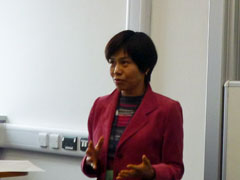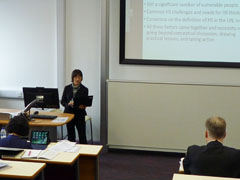Senior Research Fellow Ako Muto Presents on How the Concept of Human Security Is Accepted in East Asia at DSA2017 in the UK
2017.10.05
DSA2017, the annual conference of the Development Studies Association (DSA, UK), was held for three days beginning September 6, 2017, at the University of Bradford in the U.K. Ako Muto, Senior Research Fellow of the JICA Research Institute, and others presented the results of their research at the conference.
The theme of this conference was “Sustainability interrogated: societies, growth, and social justice.” It consisted of 59 panels with about 350 participants. Muto took the rostrum in the “Aid, statecentricity, and human security in East Asia” panel alongside JICA senior adviser Sachiko Ishikawa, Eun Mee Kim, Dean of Graduate School of International Studies, Ewha Womans University and Brendan M. Howe, Professor at Ewha Womans University in South Korea. They made the presentations mainly based on JICA’s commissioned research project “Human Security in Practice: East Asian Experiences.”
Ishikawa reported on Japan’s peacebuilding assistance in Mindanao, Philippines, using the peacemaking process between the Philippine government and Moro Islamic Liberation Front (MILF) as an example. The Japanese government promotes its “3P” strategies, namely Propaganda, Policy and Practice, as it advocates the concept of human security as a key component of its ODA. JICA bears a part of this practice through its ODA implementation, and Ishikawa presented a theoretical model showing how JICA's peacebuilding activities are perceived in the context of peace and conflict research. She explained how Japan’s peacebuilding assistance has changed under the concept of human security.

JICA senior adviser Sachiko Ishikawa spoke about Japan’s peacebuilding assistance
Muto reported on how the concept of human security has been accepted in 11 countries—eight ASEAN nations as well as Japan, China and South Korea—based on case studies by researchers in the respective countries. She said, “There is a certain level of understanding of the concept of human security in many of the countries. While some countries trust their governments and respect state sovereignty, there are also countries with tension between government and civil society. When faced by threats, countries tend to accept international cooperation for natural disasters rather than for conflicts. When countries accept international cooperation for a conflict, they tend to accept it from international organizations.”
As for the future, she noted the importance of loose regional frameworks and networks. In addition, she said that the concept of human security is a concept that could possibly complement Sustainable Development Goals (SDGs) because it eyes the downside risks—that is to say, the circumstances of a country and its people’s worsening through external shocks like conflict—as well as the empowerment of vulnerable people. She expressed her hopes for advancement of the concept of human security that keeps the diversity of East Asia in mind.

Ako Muto, Senior Research Fellow of JICA-RI, discussed the concept of human security
In the Q&A session that followed, there were questions from the audience on the clarity of the criteria for assessment of whether the concept of human security is accepted, and whether the criteria are being objectively presented. Muto answered that it may be difficult to obtain an objective understanding of how much the concept of human security is accepted, but at JICA, for example, the introduction of this concept broadened the view of assistance in the field of healthcare. She said the focus had been on the construction of large hospitals in the past, but it spread to assistance for strengthening community health and primary care facilities, making its assistance include more grassroot sites. She said this could be considered a change brought about by the concept of human security, which places people at the center of consideration. Although human security may not be a concept that will bring about swift, short-term changes, it could be understood as a concept that spreads very gradually, she said.
There are plans to publish the results in book form in the coming years.

事業事前評価表(地球規模課題対応国際科学技術協力(SATREPS)).国際協力機構 地球環境部 . 防災第一チーム. 1.案件名.国 名: フィリピン共和国.

事業事前評価表(地球規模課題対応国際科学技術協力(SATREPS)).国際協力機構 地球環境部 . 防災第一チーム. 1.案件名.国 名: フィリピン共和国.

事業事前評価表(地球規模課題対応国際科学技術協力(SATREPS)).国際協力機構 地球環境部 . 防災第一チーム. 1.案件名.国 名: フィリピン共和国.

事業事前評価表(地球規模課題対応国際科学技術協力(SATREPS)).国際協力機構 地球環境部 . 防災第一チーム. 1.案件名.国 名: フィリピン共和国.

事業事前評価表(地球規模課題対応国際科学技術協力(SATREPS)).国際協力機構 地球環境部 . 防災第一チーム. 1.案件名.国 名: フィリピン共和国.
scroll